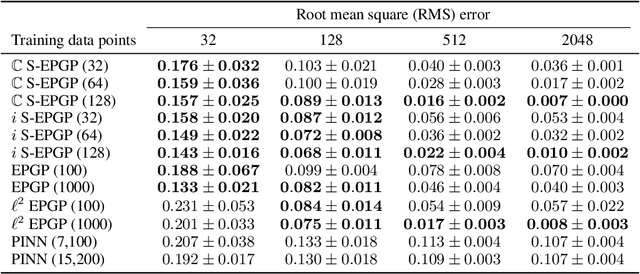Bogdan Raiţă
Comparing EPGP Surrogates and Finite Elements Under Degree-of-Freedom Parity
Nov 06, 2025Abstract:We present a new benchmarking study comparing a boundary-constrained Ehrenpreis--Palamodov Gaussian Process (B-EPGP) surrogate with a classical finite element method combined with Crank--Nicolson time stepping (CN-FEM) for solving the two-dimensional wave equation with homogeneous Dirichlet boundary conditions. The B-EPGP construction leverages exponential-polynomial bases derived from the characteristic variety to enforce the PDE and boundary conditions exactly and employs penalized least squares to estimate the coefficients. To ensure fairness across paradigms, we introduce a degrees-of-freedom (DoF) matching protocol. Under matched DoF, B-EPGP consistently attains lower space-time $L^2$-error and maximum-in-time $L^{2}$-error in space than CN-FEM, improving accuracy by roughly two orders of magnitude.
Gaussian Process Regression for Inverse Problems in Linear PDEs
Feb 06, 2025



Abstract:This paper introduces a computationally efficient algorithm in system theory for solving inverse problems governed by linear partial differential equations (PDEs). We model solutions of linear PDEs using Gaussian processes with priors defined based on advanced commutative algebra and algebraic analysis. The implementation of these priors is algorithmic and achieved using the Macaulay2 computer algebra software. An example application includes identifying the wave speed from noisy data for classical wave equations, which are widely used in physics. The method achieves high accuracy while enhancing computational efficiency.
Gaussian Process Priors for Boundary Value Problems of Linear Partial Differential Equations
Nov 25, 2024



Abstract:Solving systems of partial differential equations (PDEs) is a fundamental task in computational science, traditionally addressed by numerical solvers. Recent advancements have introduced neural operators and physics-informed neural networks (PINNs) to tackle PDEs, achieving reduced computational costs at the expense of solution quality and accuracy. Gaussian processes (GPs) have also been applied to linear PDEs, with the advantage of always yielding precise solutions. In this work, we propose Boundary Ehrenpreis-Palamodov Gaussian Processes (B-EPGPs), a novel framework for constructing GP priors that satisfy both general systems of linear PDEs with constant coefficients and linear boundary conditions. We explicitly construct GP priors for representative PDE systems with practical boundary conditions. Formal proofs of correctness are provided and empirical results demonstrating significant accuracy improvements over state-of-the-art neural operator approaches.
Gaussian Process Priors for Systems of Linear Partial Differential Equations with Constant Coefficients
Dec 29, 2022



Abstract:Partial differential equations (PDEs) are important tools to model physical systems, and including them into machine learning models is an important way of incorporating physical knowledge. Given any system of linear PDEs with constant coefficients, we propose a family of Gaussian process (GP) priors, which we call EPGP, such that all realizations are exact solutions of this system. We apply the Ehrenpreis-Palamodov fundamental principle, which works like a non-linear Fourier transform, to construct GP kernels mirroring standard spectral methods for GPs. Our approach can infer probable solutions of linear PDE systems from any data such as noisy measurements, or initial and boundary conditions. Constructing EPGP-priors is algorithmic, generally applicable, and comes with a sparse version (S-EPGP) that learns the relevant spectral frequencies and works better for big data sets. We demonstrate our approach on three families of systems of PDE, the heat equation, wave equation, and Maxwell's equations, where we improve upon the state of the art in computation time and precision, in some experiments by several orders of magnitude.
 Add to Chrome
Add to Chrome Add to Firefox
Add to Firefox Add to Edge
Add to Edge